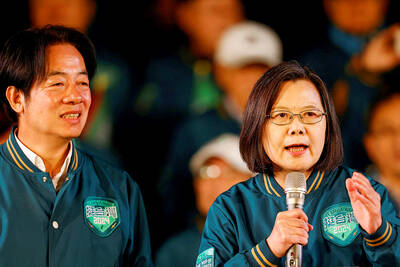For thousands of years, farmers in East Asia have relied on solar terms, or the 24 points in the traditional solar calendar, to determine when to plant and harvest their crops. Solar terms also dictate many major religious festivals and important dates such as Tomb Sweeping Day.
South Village (南村落), an arts and culture center near Shida, will be marking the next four solar terms in March and April, which herald the coming of spring, with events featuring a mouth-watering selection of traditional snacks made from seasonal ingredients. The treats include fresh mantou sweetened with brown sugar and red beans, and pastries flavored with green tea, taro, yam and plum.
The first event is Thursday, which falls on the day before the two-week solar term known as “the awakening of the insects” (驚蟄). The spring equinox (春分) will be celebrated on March 20, Tomb Sweeping Day (清明節) on April 2, and the arrival of the “grain rain” (鼓雨) which helps crops grow, on April 20.
While South Village’s events are aimed at gourmets, the activities are intended to go beyond food tastings. The center, which regularly hosts dinners and cooking demonstrations in its combined gallery and kitchen space, hopes that highlighting the importance of the solar calendar will raise awareness about global warming.

The year was 1991. A Toyota Land Cruiser set out on a 67km journey up the Junda Forest Road (郡大林道) toward an old loggers’ camp, at which point the hikers inside would get out and begin their ascent of Jade Mountain (玉山). Little did they know, they would be the last group of hikers to ever enjoy this shortcut into the mountains. An approaching typhoon soon wiped out the road behind them, trapping the vehicle on the mountain and forever changing the approach to Jade Mountain. THE CONTEMPORARY ROUTE Nowadays, the approach to Jade Mountain from the north side takes an

Relations between Taiwan and the Czech Republic have flourished in recent years. However, not everyone is pleased about the growing friendship between the two countries. Last month, an incident involving a Chinese diplomat tailing the car of vice president-elect Hsiao Bi-khim (蕭美琴) in Prague, drew public attention to the People’s Republic of China’s (PRC) operations to undermine Taiwan overseas. The trip was not Hsiao’s first visit to the Central European country. It was meant to be low-key, a chance to meet with local academics and politicians, until her police escort noticed a car was tailing her through the Czech capital. The

Last week Joseph Nye, the well-known China scholar, wrote on the Australian Strategic Policy Institute’s website about how war over Taiwan might be averted. He noted that years ago he was on a team that met with then-president Chen Shui-bian (陳水扁), “whose previous ‘unofficial’ visit to the US had caused a crisis in which China fired missiles into the sea and the US deployed carriers off the coast of Taiwan.” Yes, that’s right, mighty Chen caused that crisis all by himself. Neither the US nor the People’s Republic of China (PRC) exercised any agency. Nye then nostalgically invoked the comical specter

April 15 to April 21 Yang Kui (楊逵) was horrified as he drove past trucks, oxcarts and trolleys loaded with coffins on his way to Tuntzechiao (屯子腳), which he heard had been completely destroyed. The friend he came to check on was safe, but most residents were suffering in the town hit the hardest by the 7.1-magnitude Hsinchu-Taichung Earthquake on April 21, 1935. It remains the deadliest in Taiwan’s recorded history, claiming around 3,300 lives and injuring nearly 12,000. The disaster completely flattened roughly 18,000 houses and damaged countless more. The social activist and